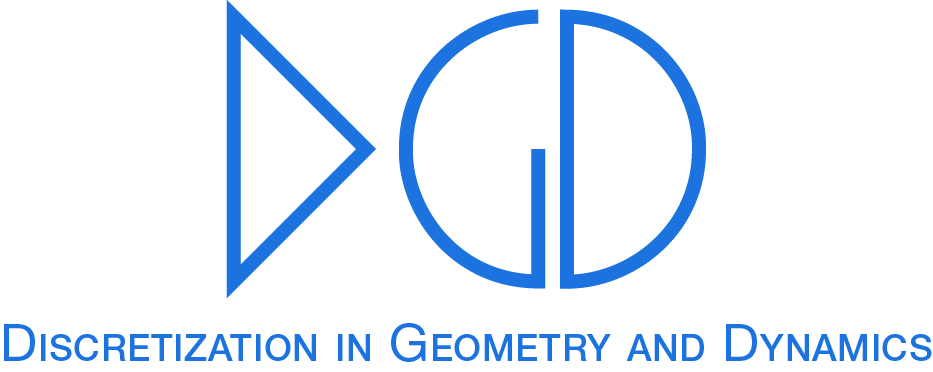|
As some of you might know, even Günter Ziegler
does age. Indeed, he will turn 50 in 2013. Since he
came to Berlin he had 22 graduate students (and
counting!), he mentored 13+ postdocs, and 5+ people
took their "Habilitation" with him.
These are more than enough reasons to CELEBRATE, and
we intend to do so on
Saturday, May 25 2013
with a 1-day conference in Günter's honor. Lunch will be
provided on site. The conference is followed by a dinner (BBQ) to
which the whole family (former students, postdocs,
collaborators, friends) are cordially invited to join;
see registration for details.
| 9:00 | Registration
opens |
| 9:30 | Gil Kalai (Jerusalem, Yale).
Geometric combinatorics, graphs and
hypergraphs
I will describe how several questions in geometric
combinatorics translate into questions about graphs
and hypergraphs and back.
Examples include:
- Borsuk's problem.
- Tverberg theorem and Tverberg type problems.
Tverberg's theorem asserts that (r-1)(d+1)+1 points
in d-space can be divided into r parts whose convex
hull intersect.
I will discuss situations where less points admit
such a partition and connections with graph theory.
- Helly type theorems and conditions on induced
subgraphs and sub-hypergraphs.
I will explain the origin to the following conjecture
of Meshulam and me: There is an absolute upper bound
for the chromatic number of
graphs with no induced cycles of length divisible by
3.
- Embedding of 2-dimensional complexes and high
dimensional minors.
I will discuss the following conjecture: A
2-dimensional simplicial complex with E edges and F
2-dimensional faces that can be embedded into 4-space
satisfies
F < 4E.
|
| 10:30 | coffee break |
| 11:00 |
Jörg Rambau (Bayreuth).
The Converse
The story of a widely believed fact.
|
| 11:30 |
Volkmar Welker (Marburg).
Geometric Combinatorics of Golod Rings and Moment
Angle Complexes
To a simplicial complex \Delta on ground set [n] and
a pair of spaces (X,A) one associates the generalized
moment angle complex or polyhedral product
Z_\Delta(X,A) as the subspace of the n-fold product
consisting of those tuples for which the set of
indices of coordinates in X-A lies in \Delta.
In the talk we recall several connections between the
topology of moment angle complexes and algebraic
properties of the Stanley-Reisner ring of \Delta, in
particular Golodness.
|
| 12:00 | lunch break |
| 14:00 | Martin Grötschel (Berlin)
LP/IP Solvers: Are there still challenges?
In this lecture I will provide a survey of the
techniques for the solution of linear and
mixed-integer optimization problems. I will
particularly focus on the algorithmic progress in the
last years and show examples of industry applications
of breathtaking size that have been solved to
optimality. But there are also large scale LPs and
small scale IPs that are unsolvable with the current
methods. And there is the "exact solution issue". Is
anyone interested in exact LP/IP solutions, can one
compute these in reasonable time? Do we need new
theory, or is current progress just a matter of
experimental mathematics? I will indicate some
answers.
|
| 15:00 | coffee break |
| 15:30 |
Volker Kaibel (Magdeburg).
Forbidden Vertices
We investigate the question what happens to a
polytope when forbidding a list of its
vertices and considering the convex hull of
the unforbidden ones. Under which conditions
does the situation remain tractable in a
geometric and/or computational sense? Under
which conditions does it not? It turns out
that also here 0/1-polytopes behave much nicer
than general ones. The talk is based on joint
work with Gustavo Angulo, Shabbir Ahmed, and
Santanu Dey (Georgia Tech).
|
| 16:00 | Karim Adiprasito (Berlin).
New constructions for projectively unique
polytopes
The study of projectively unique polytopes is a classic
subject in the theory of realization spaces of polytopes,
initiated by Perles, Shephard and McMullen. I will present
a universality theorem for projectively unique polytopes
("Every polytope is the face of a projectively unique
polytope"), and a construction for projectively unique
polytopes based on the theory of conjugate nets in
differential geometry. These constructions answer problems
of Shephard and Perles--Shephard, respectively. This
reports on joint work with Arnau Padrol and Guenter M.
Ziegler.
|
| 16:30 | Final words and transition to conference
dinner |
Registration is CLOSED.
The conference will take place at the
Konrad-Zuse-Institute in Berlin-Dahlem. Directions can be found here.
organizers
Christian Haase
Raman Sanyal
Nadja Wisniewski
we are kindly supported by




|




